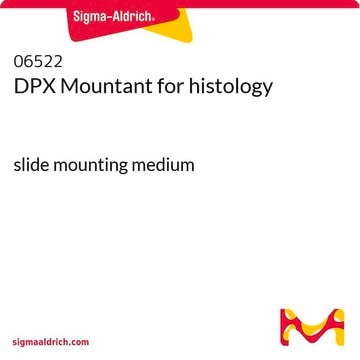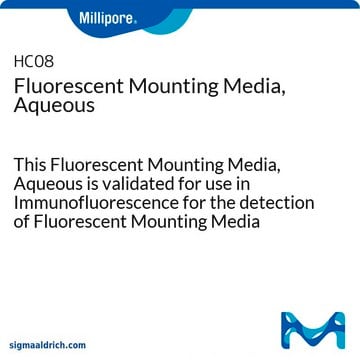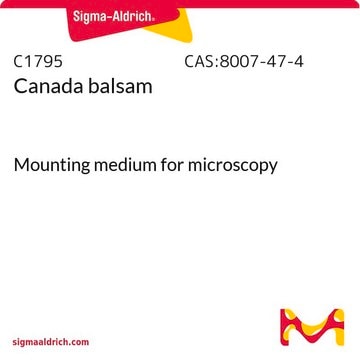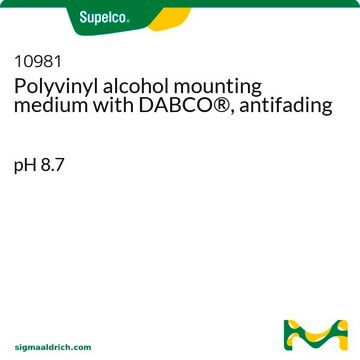C9368
CC/Mount™
tissue mounting medium
Synonym(s):
aqueous-based permanent mounting medium
Sign Into View Organizational & Contract Pricing
All Photos(1)
About This Item
UNSPSC Code:
12171500
NACRES:
NA.47
Recommended Products
form
liquid
application(s)
hematology
histology
storage temp.
room temp
Related Categories
General description
CC/Mount is an aqueous based permanent mounting medium with a very high refractive index, which when applied to the stained tissue sections can store the tissue specimens permanently without the fading of the chromogens. Because of the superior refractive index of CC/Mount, tissues mounted in this medium look like specimens mounted with organic based mounting media. No coverslipping is required with CC/Mount. However, if coverslipping is required, dried CC/Mount can be post mounted by using an organic based mounting medium. CC/Mount permits the long-term storage of antigens localized using organic insoluble chromogen substrates, including AEC, DAB, Fast Red, BCIP/NBT, BCIP/INT and fluorescent dyes like FITC and phycobiliproteins. The high pH of CC/Mount ensures increased stability of fluorescence intensity.
Application
CC/Mount is an aqueous based permanent mounting medium, similar to Crystal Mount™, for the permanent preservation of tissue sections stained with peroxidase and alkaline phosphatase based systems as well as with various fluorescent dyes.
Features and Benefits
- No need of coverslip
- No exposure to organic fumes
- Permanent storage of slides
- High resolution of tissue specimens.
Preparation Note
Storage: Store the product at room temperature. Do not refrigerate.
Remove the red end cap from the bottle and cut the tip off with a sharp razor or scissors. This will allow a smooth flow of CC/Mount and prevent formation of tiny bubbles because of squeezing.
Legal Information
CC/Mount is a trademark of Diagnostic BioSystems, Inc.
Crystal Mount is a trademark of Biomeda Corp.
related product
Product No.
Description
Pricing
Storage Class Code
10 - Combustible liquids
WGK
WGK 1
Flash Point(F)
Not applicable
Flash Point(C)
Not applicable
Personal Protective Equipment
dust mask type N95 (US), Eyeshields, Gloves
Certificates of Analysis (COA)
Search for Certificates of Analysis (COA) by entering the products Lot/Batch Number. Lot and Batch Numbers can be found on a product’s label following the words ‘Lot’ or ‘Batch’.
Already Own This Product?
Find documentation for the products that you have recently purchased in the Document Library.
Customers Also Viewed
Heterogeneity of The CD90+ Population in Different Stages of Hepatocarcinogenesis.
Thakolwiboon S, et al.
Journal of Proteomics and Bioinformatics, 7(10), 296-296 (2014)
Tilman Grune et al.
Biotechnology journal, 13(5), e1700652-e1700652 (2018-01-11)
Large amounts of data from multi-channel, high resolution, fluorescence microscopic images require tools that provide easy, customizable, and reproducible high-throughput analysis. The freeware "ImageJ" has become one of the standard tools for scientific image analysis. Since ImageJ offers recording of
CDH1 and IL1-beta expression dictates FAK and MAPKK-dependent cross-talk between cancer cells and human mesenchymal stem cells.
Al-toub M, et al.
Stem Cell Research & Therapy, 6(1), 135-135 (2015)
Saddam K Panezai et al.
The Journal of comparative neurology, 528(10), 1725-1741 (2020-01-01)
The paraflocculus and the neighboring smaller flocculus form a remarkable protrusion in the ventrolateral aspect of the mouse cerebellum, in which the longitudinal compartments are conspicuously oriented perpendicularly to the sagittal plane. The developmental process of such anatomical arrangements in
The Use of Sequential VEGF- and BMP2-Releasing Biodegradable Scaffolds in Rabbit Mandibular Defects.
Nilüfer Çakır-Özkan et al.
Journal of oral and maxillofacial surgery : official journal of the American Association of Oral and Maxillofacial Surgeons, 75(1), 221-221 (2016-10-25)
Promising developments have materialized in reconstructive surgical procedures with the applications of tissue engineering. In our study, we used tissue scaffolds fabricated from polylactic acid-polyethylene glycol (PLLA-PEG) copolymers to ensure different release rates of selective growth factors recombinant human bone
Our team of scientists has experience in all areas of research including Life Science, Material Science, Chemical Synthesis, Chromatography, Analytical and many others.
Contact Technical Service












